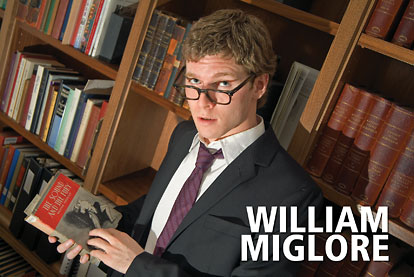HOW I GOT STARTED
William Miglore

Bill Miglore, who does not wear glasses or read Faulkner, except when posing for photographs, is an early favorite to win Fine Books & Collections’s first collegiate book-collecting championship. This picture was taken in the Amherst College special collections library, where he works. Miglore has won the Lane Prize for Excellence in book collecting twice, and he continues to work on the collection he hopes will garner him an unprecedented third award (and entry in our contest along with it). The only other two-time winner at Amherst is Richard Linenthal, who went straight from college to Quaritch, the esteemed London booksellers, where he is now a director
Ray Bradbury & Truman Capote
If you don’t count an elementary-school accumulation
of 200 Bobbsey Twins books, my real collecting started in middle school.
I’m of the generation of collectors that an older generation regards
with some sorrow or suspicion (or so I hear) because I do most of my research
and collecting online. By junior high, I’d been reading Ray Bradbury
for several years, but it was online, for instance, that I learned that
Bradbury was still alive and a generous signer of books. So, with the innocent
motivation that I could get my books signed, I started searching out affordable
copies of his first editions. I got my parents to take me to signings and
always showed up with a packing box of books and ephemera, which Bradbury,
though he was always surprised, always inscribed.
My philosophy then was to buy as much as I could
as quickly as I could, with the understanding that Bradbury wouldn’t
be around forever, although luckily, he still is. I conceded right away
that I couldn’t afford perfect copies, but I did quickly develop a
bare-minimum sensitivity to matters of condition and issue. By reading online
databases the way people used to read dealer catalogs, I’ve taught
myself the terminology of collecting and the bibliographic facts about authors
that interest me, often without the aid of a printed bibliography.
There’s only so much you can learn by shopping,
though. I soon found out how helpful it was to be in touch with more experienced
collectors and experts in the field. By chance, I made the acquaintance
of several “retired” Bradbury collectors who were more than
happy to regale me with stories of their best books and showered me with
helpful presents from the remains of their collections. I started collecting
Truman Capote in high school, and I’ve kept up a friendly correspondence
with an expert dealer and with Gerald Clarke, Capote’s biographer,
too.
Since Capote was already gone when I started collecting
his books, and there would be no befriending him, I decided to take my time
and buy only the best things I could afford. In the case of trade editions,
I try for copies already inscribed, since there won’t be any opportunities
for that. I’m still far from assembling a complete Capote collection,
but I’m proud of the things I have, and I’ve stuck to my guns
and have been as discerning as it’s practical to be.


